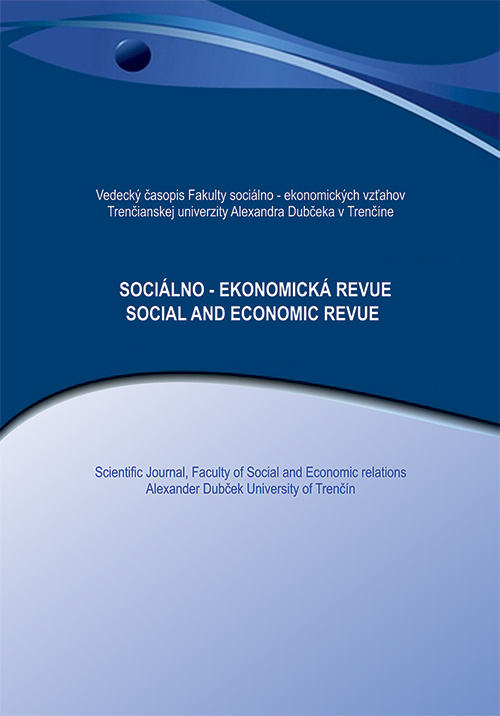ARTIFICIAL INTELLIGENCE IN THE AGRI-FOOD INDUSTRY
The agri-food industry faces productivity challenges due to low levels of automation and a lack of innovative solutions. Artificial intelligence can become a tool to meet these challenges. Existing artificial intelligence solutions are already inevitably changing the agri-food industry. This technology is evolving rapidly and its range of applicability is expanding. The article presents an analysis the model of Benefits, Organizational Readiness and External Pressure (BOE) application to artificial intelligence in the agri-food industry. The model constructs – farm readiness, perceived benefits, external pressure– are analyzed in the agri-food industry. Growing investment in technological innovation in the agri-food industry shows that farms are organized to adopt artificial intelligence technology, realize the benefits, and external pressures accelerate the adoption of this technology. Financial resources are often identified as a major barrier to the use of artificial intelligence on farms, but the lack of financial resources can be overcome as an alternative to new business models in the agri-food industry.
Vydanie: 2022/2 Strany: 5-11 Klasifikácia JEL: Q01, Q16, Q18
DOI: https://doi.org/10.52665/ser20220201
Kľúčové slová: Agri-food industry, artificial intelligence, new business models
Sekcia:
Kontakty:
Mgr. Vaida Bačiulienė
Kaunas University of Technology,
School of Economics and Business,
e-mail: vaida.baciulienė@ktu.edu
Prof. Ing. Dr. Valentinas Navickas
Social and Economic Relations Faculty,
Alexander Dubček University of Trenčin;
e-mail: valentinas.navickas@tnuni.sk
Literatúra:
Bačiulienė, V., Jegelavičiūtė, R., Petrokė, I. (2020). Stakeholders and their interests in the implementation of the Lithuanian artificial intelligence strategy. Sociálno-ekonomická revue = Social and economic revue, 18(4), 5-11.
Berlin, A., Verstegen, J., Aguado, R. (2020). D4.9 IOF2020 Use Case Business Models. Internet of Food and Farm, 2020
Brachman, R. J. (2006). (AA)AI – more than the sum of its parts. 2005 AAAI Presidential Address. AI Magazine, 27(4), 19-34.
Brynjolfsson, E., Rock, D., Syverson, D. (2018). The Productivity J-Curve: How Intangibles Complement General Purpose Technologies. Working paper, 2018.
Chwelos, P., Benbasat, I., Dexter, A., S. (2001). Research Report: Empirical Test of an EDI Adoption Model. Information systems research, 2001-09-01, 12(3), 304-321. Retrieved from doi: 10.1287/isre.12.3.304.9708
Dasgupta, A. ir Wendler, S. (2019). AI Adoption Strategies. Centre for Technology and Global
Affairs Department of Politics and International Relations, University of Oxford, Working Paper Series No. 9. Retrieved from: https://www.ctga.ox.ac.uk/files/aiadoptionstrategies-march2019pdf
Financial Times. (2020). Investment in agritech declines as apetite for food delivery wanes. Retrieved from: https://www.ft.com/content/88360cd4-5731-11ea-abe5-8e03987b7b20
Haenlein, M., Kaplan, A. (2019). Siri, siri in my hand, who is the fairest in the land? On the Interpretations, Illustrations and Implications of Artificial Intelligence. Business Horizons, 62(1), 15-25.
Iacovou, Ch. L., Benbasat, I., Dexter A. S. (1995). Electronic Data Interchange and Small Organizations: Adoption and Impact of Technology. The Society for Information Management and the Management Information Systems Research Center, 19 (4), 465-485. Retrieved from doi: 10.2307/249629
Markets and markets (2021). Artificial Intelligence in Agriculture Market by Technology (Machine Learning, Computer Vision, and Predictive Analytics), Offering (Software, Hardware, AI-as-a-Service, and Services), Application, and Geography - Global Forecast to 2026 [žiūrėta 2021-02-08]. Retrieved from: https://www.marketsandmarkets.com/Market-Reports/ai-in-agriculture-market-159957009.html
Mehrtens, J., Cragg, P. B., Mills, A.M. (2001). A model of Internet adoption by SME‘s. Information & management, 39 (3), 165-176.
Monett, D., Lewis C., W., P. (2018). Getting clarity by defining Artificial Intelligence –A Survey. Studies in Applied Philosophy, Epistemology and Rational Ethics, 44. Retrieved from: https://doi.org/10.1007/978-3-319-96448-5_21
Nilsson, N., J. (2010). The Quest for Artificial Intelligence: A History of Ideas and Achievements. Cambridge: Cambridge University Press
Scotti, V. (2020), Artificial Intelligence. IEEE instrumentation and measurement magazine, 23(3), 27-31. Retrieved from doi: 10.1109/MIM.2020.9082795
Wang, P. (2019). On Defining Artificial Intelligence. Journal of Artificial General Intelligence 10(2), 1-37. Retrieved from doi: https://doi.org/10.2478/jagi-2019-0002


